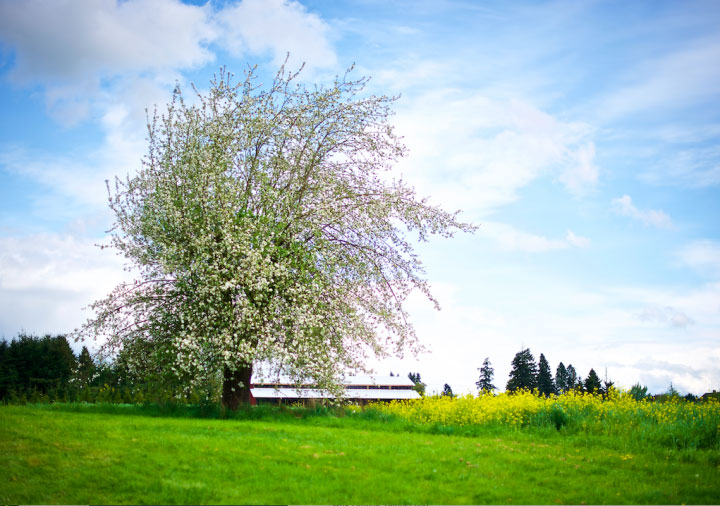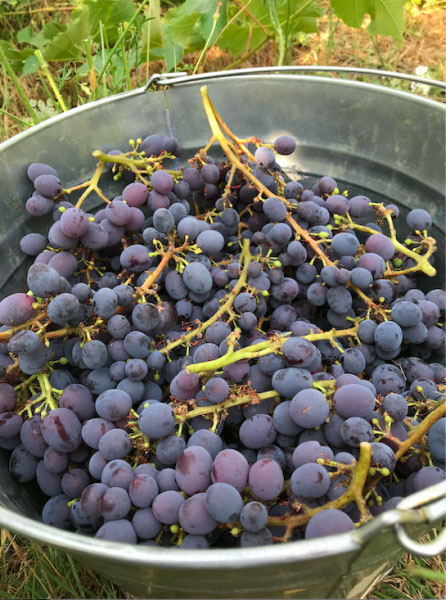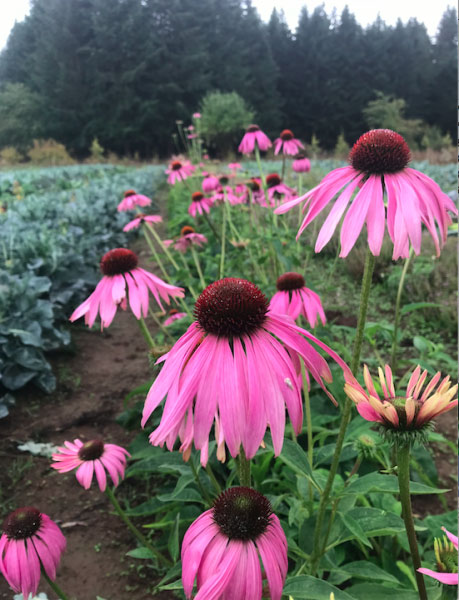March 12, 2019 – By Lauren Snyder, Research & Education Associate, OFRF

March 12, 2019 – As I was eating my breakfast this morning, I looked out the window and caught a glimpse of a bobcat passing through our field. It was such an incredible way to start the day; feeling inspired by nature and grateful to live in such a beautiful environment. However, my cheery mood quickly evaporated when I got to the office and skimmed the latest headlines. These days, it seems every time we open our devices, we are confronted with another bleak article explaining that “we’re going to hell in a handbasket,” as one of my mentors likes to put it.
For example, many of us have heard that there will likely be more plastic than fish in the oceans by 2050, and we are already experiencing the devastating effects of anthropogenic climate change in the form of more frequent and severe fires, floods, droughts, and storms. Now, add to that depressing list the alarming news from a recent scientific review revealing dramatic losses in insect biodiversity that could lead to the extinction of 40% of the world’s insect species over the next few decades (Sánchez-Bayo & Wyckhuys, 2019). With this news, you may be tempted to throw up your hands in frustration and walk away, but I encourage you to read on because this is an issue you have the power to tackle—just by eating. Let me explain.
The Problem
We are living through the sixth major extinction—species around the globe are disappearing at never-before-seen rates. While most attention is focused on vertebrate species loss, such as mammals and birds, a recent article in the journal of Biological Conservation indicates that the local extinction rate of insect species is eight times higher than that of vertebrates. That is something we should all be very concerned about. As the authors of the study explain, “because insects constitute the world’s most abundant and speciose animal group and provide critical services within ecosystems, such an event cannot be ignored and should prompt decisive action to avert a catastrophic collapse of nature’s ecosystems.”
 Insects may be more discrete than their charismatic vertebrate counterparts, but the ramifications of their dramatic decline will be anything but inconspicuous. Individually unassuming, insects comprise roughly one gigaton of biomass carbon on Earth (Bar-on et al., 2018) and support a number of valuable services that we rely on every day, such as pollination, pest control, and nutrient cycling (Aizen et al., 2009). Insects also play an essential role as food resources for many vertebrates, including moles, lizards, birds, bats, and fish.
Insects may be more discrete than their charismatic vertebrate counterparts, but the ramifications of their dramatic decline will be anything but inconspicuous. Individually unassuming, insects comprise roughly one gigaton of biomass carbon on Earth (Bar-on et al., 2018) and support a number of valuable services that we rely on every day, such as pollination, pest control, and nutrient cycling (Aizen et al., 2009). Insects also play an essential role as food resources for many vertebrates, including moles, lizards, birds, bats, and fish.
The new study documents a reduction in a large number of insect species concurrent with an increase in a small number of adaptable (often non-native) species that are filling vacated niches. The overall result is that insect communities are, in general, becoming more uniform and less diverse. This shift will have major repercussions for the ecosystem services provided by insects.
The mass decline we are witnessing in insects is particularly concerning because it includes not only specialist species, which rely on a specific habitat or resource and are therefore more susceptible to subtle shifts in the environment, but also generalist species, which we would expect to be more resilient to external stressors because they tend to be more flexible in terms of their food and/or living preferences. The fact that we see a decline in both specialist and generalist insects suggests the causes of the decline are not isolated to specific habitats or traits, but are more broad-reaching and affect traits shared among all insects.
The Causes
So what underlies this broad decline in insect diversity and abundance? While there are several causes, the biggest culprit appears to be agriculture; or more specifically, intensive agricultural practices that rely on the use of synthetic fertilizers and pesticides. “The intensification of agriculture over the past six decades stands as the root cause of the problem, and within it the widespread, relentless use of synthetic pesticides is a major driver of insect losses in recent times (Dudley & Alexander, 2017),” says the review.
Habitat loss and pollution are the biggest drivers of insect declines and both are associated with modern day agriculture. As the review describes, in the first half of the 20thcentury, the conversion of forests, wetlands, grasslands, and other natural habitats to agriculture in North America and Europe negatively affected overall biodiversity. Today, roughly 40% of terrestrial surfaces are dedicated to agricultural uses (FAO 2009). These land use changes negatively affected insect communities, but we began to see even larger insect declines during the Green Revolution when traditional, low-input farming practices were largely replaced by industrial practices heavily reliant on synthetic inputs to control pests and support crop yields. While the changes associated with the Green Revolution did not necessarily involve further loss of natural habitats, the widespread implementation of monocultures led to a significant reduction in insect biodiversity—creating prime conditions for agricultural pests to flourish. According to the review’s authors, “the conclusion is clear: unless we change our ways of producing food, insects as a whole will go down the path of extinction in a few decades.”
How We Can Solve It
Ironically, while agriculture has been identified as one of the main drivers of the major insect decline, it also has potential to be the solution. The solution, say the authors of the review, requires “a rethinking of current agricultural practices, in particular a serious reduction in pesticide usage and its substitution with more sustainable, ecologically-based practices.”
 Organic agriculture has the potential to provide this solution, as it prohibits the use of synthetic fertilizers and pesticides, and therefore reduces environmental pollution associated with the reduced abundance and diversity of insects. A recent publication in Nature demonstrated that organic farming systems enhanced pest control services compared to conventional systems and that implementation of organic practices can reduce the use of synthetic pesticides (Muneret et al. 2018). Moreover, best management of organic systems involves implementing practices such as wildflower strips, hedgerows, and diversified crop rotations, which have been shown to enhance the abundance of wild insect species (Kremen & Merenlender, 2018).
Organic agriculture has the potential to provide this solution, as it prohibits the use of synthetic fertilizers and pesticides, and therefore reduces environmental pollution associated with the reduced abundance and diversity of insects. A recent publication in Nature demonstrated that organic farming systems enhanced pest control services compared to conventional systems and that implementation of organic practices can reduce the use of synthetic pesticides (Muneret et al. 2018). Moreover, best management of organic systems involves implementing practices such as wildflower strips, hedgerows, and diversified crop rotations, which have been shown to enhance the abundance of wild insect species (Kremen & Merenlender, 2018).
This is where you, the reader, come into the story because you have the power to change the way we grow our food. Remember how I said you can tackle this issue just by eating? Well, by electing to eat organically produced food, you are sending a message that you care about where your food comes from and the impact its production has on the environment and its inhabitants. Eating organic supports farmers who implement practices that promote biodiversity and good stewardship of the land.
It can be debilitating to confront the myriad of seemingly apocalyptic environmental issues our society is facing, but there are straightforward decisions you can make today to resolve these issues. And, it all starts with what you’re putting on your plate.
References:
Aizen, M. A., Garibaldi, L. A., Cunningham, S. A., Klein, A. M. 2009. How much does agriculture depend on pollinators? Lessons from long-term trends in crop production. Ann. Bot. 103: 1579-1588.
Bar-On, Y. M., Phillips, R., Milo, R. 2018. The biomass distribution on Earth. PNAS. 115 (25): 6506-6511.
Dudley, N., Attwood, S. J., Goulson, D., Jarvis, D., Bharucha, Z. P., Pretty, J. 2017. How should conservationists respond to pesticides as a driver of biodiversity loss in agroecosystems? Bio. Conserv. 209: 449-453.
FAO 2009. Statistics from www.faostat.fao.org, Rome, Italy: FAO
Kremen, C., and A. M. Merenlender. 2018. Landscapes that work for biodiversity and people. Science. 362.
May, R. M., 2010. Ecological science and tomorrow’s world. Philos. Trans. R. Soc. Lond. B Biol. Sci. 365: 41-47.
Muneret, L., Mitchell, M., Seufert, V., Aviron, S. Djoudi, E. A., Pétillon, J., Plantegenest, M., Thiéry, D., Rusch, A. 2018. Evidence that organic farming promotes pest control. Nature. 1: 361-368.
Sánchez-Bayo, F., and K. A. G.Wyckhuys. 2019. Worldwide decline of the entomofauna: A review of its drivers. Biological Conservation. 232: 8-27.
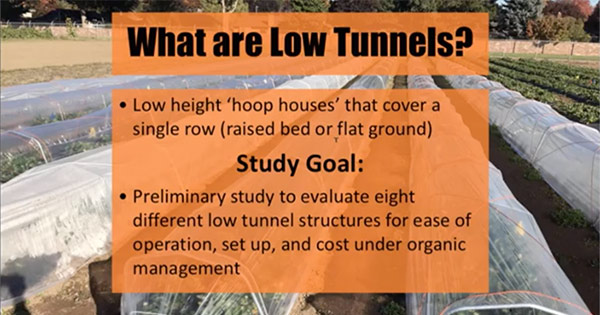 March 22, 2019 – Recordings from the 2019 Organic Agriculture Research Forum held in February are now posted. There are 15 sessions covering a wide range of topics available to view. View 2019 Organic Agriculture Research Forum sessions.
March 22, 2019 – Recordings from the 2019 Organic Agriculture Research Forum held in February are now posted. There are 15 sessions covering a wide range of topics available to view. View 2019 Organic Agriculture Research Forum sessions.



 Insects may be more discrete than their charismatic vertebrate counterparts, but the ramifications of their dramatic decline will be anything but inconspicuous. Individually unassuming, insects comprise roughly one gigaton of biomass carbon on Earth (Bar-on et al., 2018) and support a number of valuable services that we rely on every day, such as pollination, pest control, and nutrient cycling (Aizen et al., 2009). Insects also play an essential role as food resources for many vertebrates, including moles, lizards, birds, bats, and fish.
Insects may be more discrete than their charismatic vertebrate counterparts, but the ramifications of their dramatic decline will be anything but inconspicuous. Individually unassuming, insects comprise roughly one gigaton of biomass carbon on Earth (Bar-on et al., 2018) and support a number of valuable services that we rely on every day, such as pollination, pest control, and nutrient cycling (Aizen et al., 2009). Insects also play an essential role as food resources for many vertebrates, including moles, lizards, birds, bats, and fish. Organic agriculture has the potential to provide this solution, as it prohibits the use of synthetic fertilizers and pesticides, and therefore reduces environmental pollution associated with the reduced abundance and diversity of insects. A recent publication in Nature demonstrated that organic farming systems enhanced pest control services compared to conventional systems and that implementation of organic practices can reduce the use of synthetic pesticides (Muneret et al. 2018). Moreover, best management of organic systems involves implementing practices such as wildflower strips, hedgerows, and diversified crop rotations, which have been shown to enhance the abundance of wild insect species (Kremen & Merenlender, 2018).
Organic agriculture has the potential to provide this solution, as it prohibits the use of synthetic fertilizers and pesticides, and therefore reduces environmental pollution associated with the reduced abundance and diversity of insects. A recent publication in Nature demonstrated that organic farming systems enhanced pest control services compared to conventional systems and that implementation of organic practices can reduce the use of synthetic pesticides (Muneret et al. 2018). Moreover, best management of organic systems involves implementing practices such as wildflower strips, hedgerows, and diversified crop rotations, which have been shown to enhance the abundance of wild insect species (Kremen & Merenlender, 2018). March 7, 2019 – Despite the rain and wind that blew through Southern California yesterday, hundreds of organic supporters made their way to the National Grove of Anaheim for OFRF’s all-organic luncheon. The meal, the people, and the atmosphere make this traditional kick-off to Expo West a much-loved tradition. The event raised over $100,000 for OFRF’s research, education, and advocacy programs. We are deeply grateful to everyone who attended and to all of the supporters that made this event a success.
March 7, 2019 – Despite the rain and wind that blew through Southern California yesterday, hundreds of organic supporters made their way to the National Grove of Anaheim for OFRF’s all-organic luncheon. The meal, the people, and the atmosphere make this traditional kick-off to Expo West a much-loved tradition. The event raised over $100,000 for OFRF’s research, education, and advocacy programs. We are deeply grateful to everyone who attended and to all of the supporters that made this event a success.



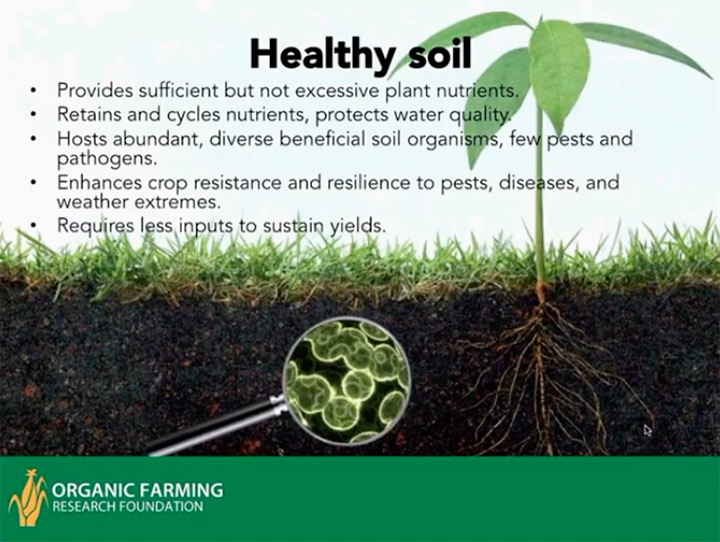
 February 12, 2019 – Newly appointed to the External Advisory Board of the UC Davis Agricultural Sustainability Institute (ASI), OFRF Executive Director Brise Tencer was introduced at the annual meeting in January in Davis, California.
February 12, 2019 – Newly appointed to the External Advisory Board of the UC Davis Agricultural Sustainability Institute (ASI), OFRF Executive Director Brise Tencer was introduced at the annual meeting in January in Davis, California.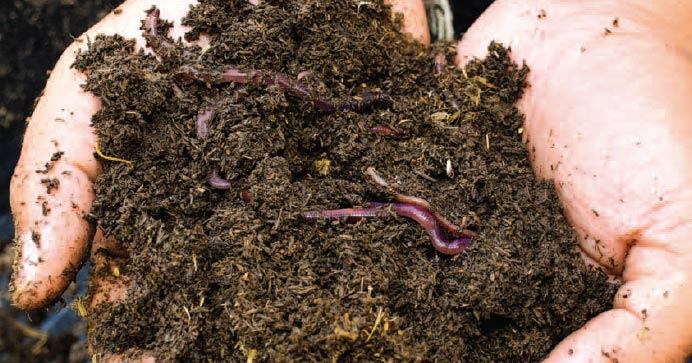 January 29, 2019 – OFRF’s research program got a big boost thanks to a matching grant from the Foundation for Food and Agriculture Research (FFAR). The $66,000 match will be used to support OFRF’s 2019 organic research grant awards related to soil health, including carbon sequestration, reduced tillage systems, and fertility management focused on reducing environmental impacts and improving soil health.
January 29, 2019 – OFRF’s research program got a big boost thanks to a matching grant from the Foundation for Food and Agriculture Research (FFAR). The $66,000 match will be used to support OFRF’s 2019 organic research grant awards related to soil health, including carbon sequestration, reduced tillage systems, and fertility management focused on reducing environmental impacts and improving soil health.
